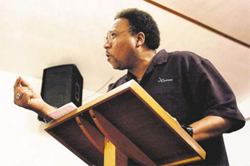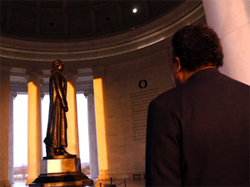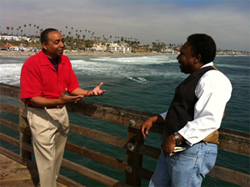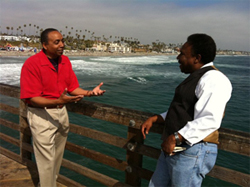How does a former NAACP chapter president, a self-proclaimed liberal who championed the likes of Al Sharpton and Jesse Jackson, end up in the hyper-conservative Tea Party?

C.L. Bryant will tell you how, because that’s his story—one he shares in Runaway Slave, a new documentary now playing in limited theaters. In the film, Bryant, former pastor of a Texas Baptist church, depicts the conservative roots of the African American community and argues that a new Underground Railroad movement is necessary for liberation from entitlements.
Bryant believes that many blacks don’t appreciate the freedoms and opportunities in place since the civil rights movement, instead living as if they’re still under oppression and injustice. He also calls on conservatives to tell their side of African American history.
He analyzes the views and conceptions of the black community, and interviews conservative African American leaders such as Herman Cain, Dr. Alveda King (niece of Dr. Martin Luther King Jr.), economist Thomas Sowell, and more.
Bryant spoke with CT’s Jasmine Young about his intentions and purpose behind the film.
You were once an NAACP leader, and now you’re a conservative Tea Party patriot who openly criticizes the NAACP. How did that happen?
Twenty-three years ago when I was president of the NAACP in Garland, Texas, I was asked by the national office to speak at a prochoice rally. As a minister and person of faith, I could not reconcile that, so I turned it down. In doing so, my star that was rising in the organization began to take a decline. They not only wanted to control me, they wanted to use me to control a block of people. So I started on a conservative path with them turning on me.
How has the NAACP moved away from its original mission?
They have been totally co-opted by progressive liberals and the far left part of the Democrat Party. It’s been a thorough takeover of the organization. When the organization was founded [in 1909], many black Americans were Republicans, and the organization was nonpartisan. It was set up not only with black people, but many former abolitionists too. But now the NAACP is no longer in tune to the value system of the people it was created to serve.
What criticism do you receive because of your political views?
It’s paradoxical in the way I am received and the movie is received. For example, Nancy Pelosi and Rick Santorum are both Italian; one is a Democrat, one a Republican. They don’t vilify each other for being a bad Italian, for being Republican or Democrat. But with black people, unfortunately, if you have a different political viewpoint, then you often become evil in the sight of the group. And as portrayed it in the film, it’s tied to tribalism.
Why do you think African Americans feel that way?
Because they have not realized that we as a people have evolved, like every other ethnic group that came to this country. Even though ours was very much involuntary, we still were brought to these shores and we have been emancipated here in America. And we now have the same opportunities as anyone else. But many black people still are crippled by the rhetoric of people like Al Sharpton and Jesse Jackson, who want to keep them co-dependent upon the government policies and programs of the Great Society and Lyndon Johnson.

How does your Christian faith inform your beliefs and impact your work?
I am a strong believer in the Judeo-Christian principles that shaped and formed our country, even though in the early years of our American existence those beliefs did not free my great-grandparents. But those beliefs eventually shaped the consciousness of an American people that causes me to be able to speak the way I do today as a free man. I’m a representative of perhaps the greatest success story the world has ever known—the survival of a people who went through slavery, and now a person who is able to defend those same values that not only freed my great-grandparents but keeps me free now. It’s those Christian values that not only free me, but keep many people in the world free. As Christians, we’ve always defended the rights of others to practice their faith freely. I want to make certain through exercising my faith that I pass along to everyone else in search of freedom those liberties, individual freedoms, and strong Christian principles.
Do you consider yourself a Republican or a Tea Party member?
I am a black conservative who happens to vote for the Republican Party. I am a Tea Partier, for certain, but I am a conservative first, as most black people are in their core. They simply need to be reawakened.
Do you think President Obama gets the message you’re spreading about the conservative beliefs of African Americans?
He understands the message, but I think he has been conditioned to discount it, because all indications show us he is a socialist-leaning president who believes in big government programs to be the cure all for the poor, the masses. So what we see is the effect of big government, which as far as our movie is concerned is the “new plantation.”
You refer to yourself as the “runaway slave.” Please explain.
It’s like Frederick Douglas, and anyone else in that time period, had the courage to think, I know there’s freedom out there, but I also realize I am locked into a system that if I don’t escape it, I will remain enslaved. In other words, the master is providing my housing and my food, and he’s telling me what to do with my life. A runaway slave wants to escape the tyranny of a plantation, because the blessings of liberty are available for anyone.
Some people might say your movie title is hyperbolic, or criticize your referral to people on welfare as “slaves.” Are you intentionally pushing buttons?
It is designed to grab the attention, but it is no less truthful. When we talk about 47 percent of all American families in this country receiving some type of government assistance, we’re not just talking about people who are “identifiably” on welfare. We’re headed toward a total collapse of our economic system if, in fact, our country becomes a nanny state. So if you’re focusing on the word slave you’re focusing in on the wrong word, but if you’re focusing in on the idea of fleeing it and restoring the blessings of liberty found in the free market, then you get the idea of what this movie’s about.
Is President Obama the reason for the increase in families on government programs?
George W. Bush started the ball rolling, so he is not without blame. The idea that this is totally Obama’s baby is not true. But the policies he put into place have not helped at all. And he said himself that if the policies he instituted did not help, then he would be looking at perhaps one term. And that’s exactly what he’s looking at.
What inspired you to make this film?
The realization that our conversation about race had not really changed over 40 years. Here we were still talking about being angry as black folks, being angry as Americans, and being racially divided down color lines and political lines.
Black peoples’ liberties and civil rights have been championed by and large by the Republican Party, but blacks are told that Republicans are evil and that conservative ideas are evil. We’re told that by people who are controlled by the progressive left. But that’s not true. And because we don’t read for ourselves the history that brought us to where we are today, we miss out on where we have come from and how we actually got here.
Do you believe that government assistance or the welfare system needs to be completely eliminated, or do you think that it simply needs reform?
Bill Clinton had a very good idea for welfare that was working, and Obama has pretty much taken the teeth out of it. There are people who legitimately need assistance, but there are always those who abuse it. So there must be some type of reform, because, evidently, we’re not going to be able to sustain a welfare state. [Editor’s note: In 1996, Clinton enacted the Personal Responsibility and Work Opportunity Reconciliation Act, which required “work in exchange for time-limited assistance.” The act was seen as promoting employment among the poor.]

How would the government distinguish between those who truly need those programs and those who are taking advantage of the system?
Guidelines should be put in place for those who abuse the system for pleasure—those who like to drink and abuse themselves with things that are intoxicating. That type of person doesn’t have the government’s foot on his neck, the white man’s foot on his neck, or society’s foot on his neck. His own foot is on his neck. There are many guidelines we can explore as far as putting people to work in lieu of welfare.
In the film you capture the divide on the Washington Mall on MLK Day—between the NAACP and those who claim racism is still alive, and those like Dr. Alveda King who say we are essentially free of racism. Why does this divide still exist?
Because we have failed to keep clear the dream that Dr. King had that one day we could be judged by the content of our character instead of the color of our skin. But today, people are still talking about color and not character. Black people in particular have taken a step backward as far as that is concerned. As long as we are not looking to be recognized for what we bring to the table but for what we can get off the table, then I believe this divide will continue.
How can race relations be discussed in a context that is beneficial for all?
It has to be talked about intellectually instead of emotionally, but there has to be the conversation. The movie was made to take the conversation in a different direction. Race will never go away as long as there are people of different colors. But at least we can deal with it in a way that is beneficial instead of destructive.
You’ve mentioned that African Americans are still angry today. Angry at what?
The anger is directed at those perceived to be the enemy—conservatives and Republicans. Now, the question has to be, “Why is it directed toward them and not those who are actually the problem?” If you ask the average black child who started the KKK, they would say it was the Republican Party. If you were to ask the average black person whether liberals or conservatives portray their values the most, they would say liberals. It’s an indication that the progressive liberals have been the most successful in co-opting not only the black mindset in schools, but also the black church and the black preacher. And conservatives have not done a very good job at telling their side of the story.
Why are conservatives not taking up this role?
I’ve talked to many Republicans and conservatives about this. I want to awaken them to their built-in strength in the African American community—the history of the Republican Party and conservatives, their actual activity in freeing the black person in this country. But they have not used the tool, the great hammer in their own hand, because they think it’s futile. Some have this idea that because Democrats have been so successful in co-opting the mindset of black people, then what’s the use? But that’s laziness, because you have the tool in your hand to actually change the equation in your favor.
Now the time is absolutely right for doing this. People in the black community are thirsty for something else. We have tried the Democrat Party for 60 years, and we’re still angry, still enslaved, still unemployed. Children are at an all-time high dropout rate. Abortions are rampant. So conservatives should see a golden opportunity to reach out to those who feel they have been left out from under the umbrella of conservatism.
If Dr. King were alive, what might he say about race relations in America today?
I think he would be saddened to see how it has been used as a scheme by those who took the reins of civil rights. Because of King’s untimely death, he was unable to put in place the proper successors who would institute his dream, so there were those who turned his dream into a scheme.
What do you imagine Dr. King would think of your message today?
King himself was a runaway slave. A well educated Morehouse man, and one of the most eloquent orators of all time. But he found it necessary to become a conductor on the “New Underground Railroad,” to make a pathway to freedom for those still in bondage. So I believe he would be in favor of what we are doing, because it would be apparent to him that black folks are still just about as mentally enslaved as we were in the sixties.
Do you believe Governor Romney gets your message and can relay it to the black community?
I would like to be as much help to Governor Romney as possible. I think it’s important that he chooses a VP candidate with crossover appeal. The Republican ticket cannot be “all vanilla.” It has to appeal to those who are looking for the Republican Party to broaden its tent. And I think Romney has a great opportunity now with Marco Rubio. I believe Rubio will bring in the youth vote, he will appeal to a large base of the Latino vote, and he will definitely capture the hearts of Tea Partiers. And in doing so, I think Romney will be able to redefine what it is to be a conservative.
© 2012 Christianity Today. All rights reserved. Click for reprint information.












